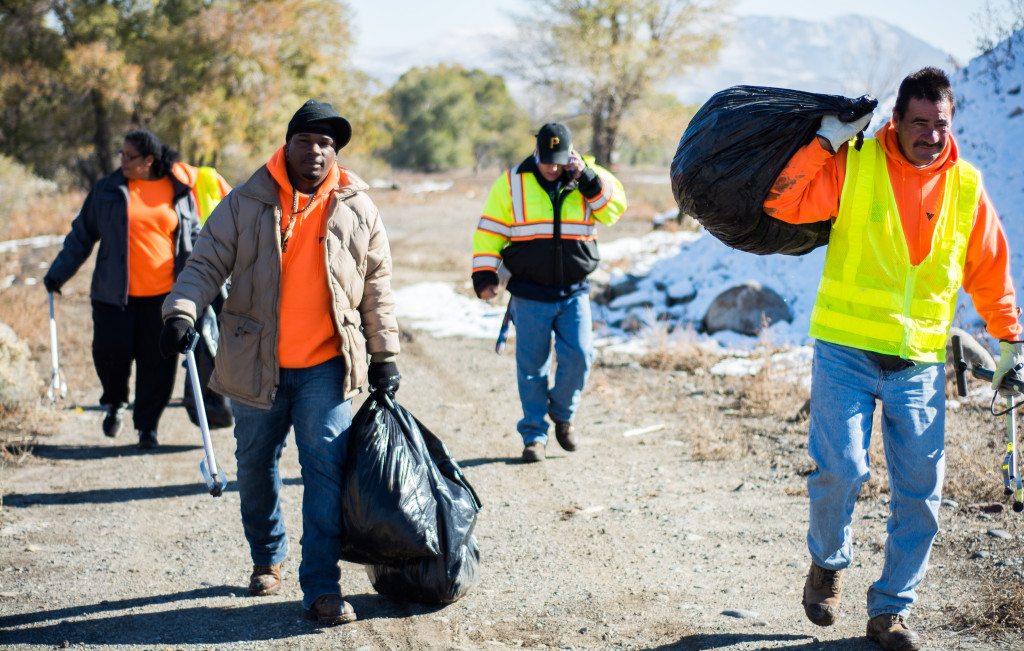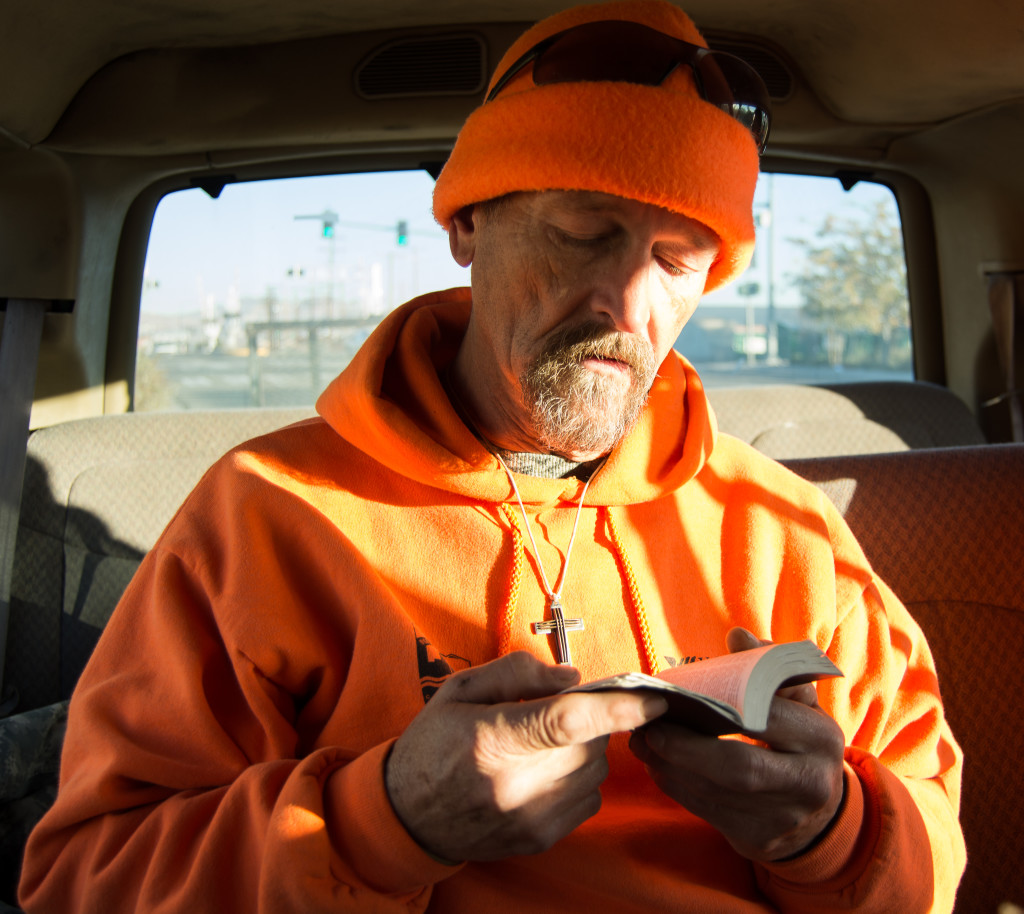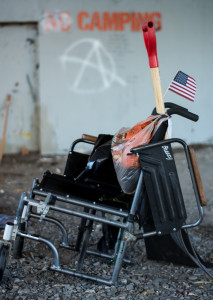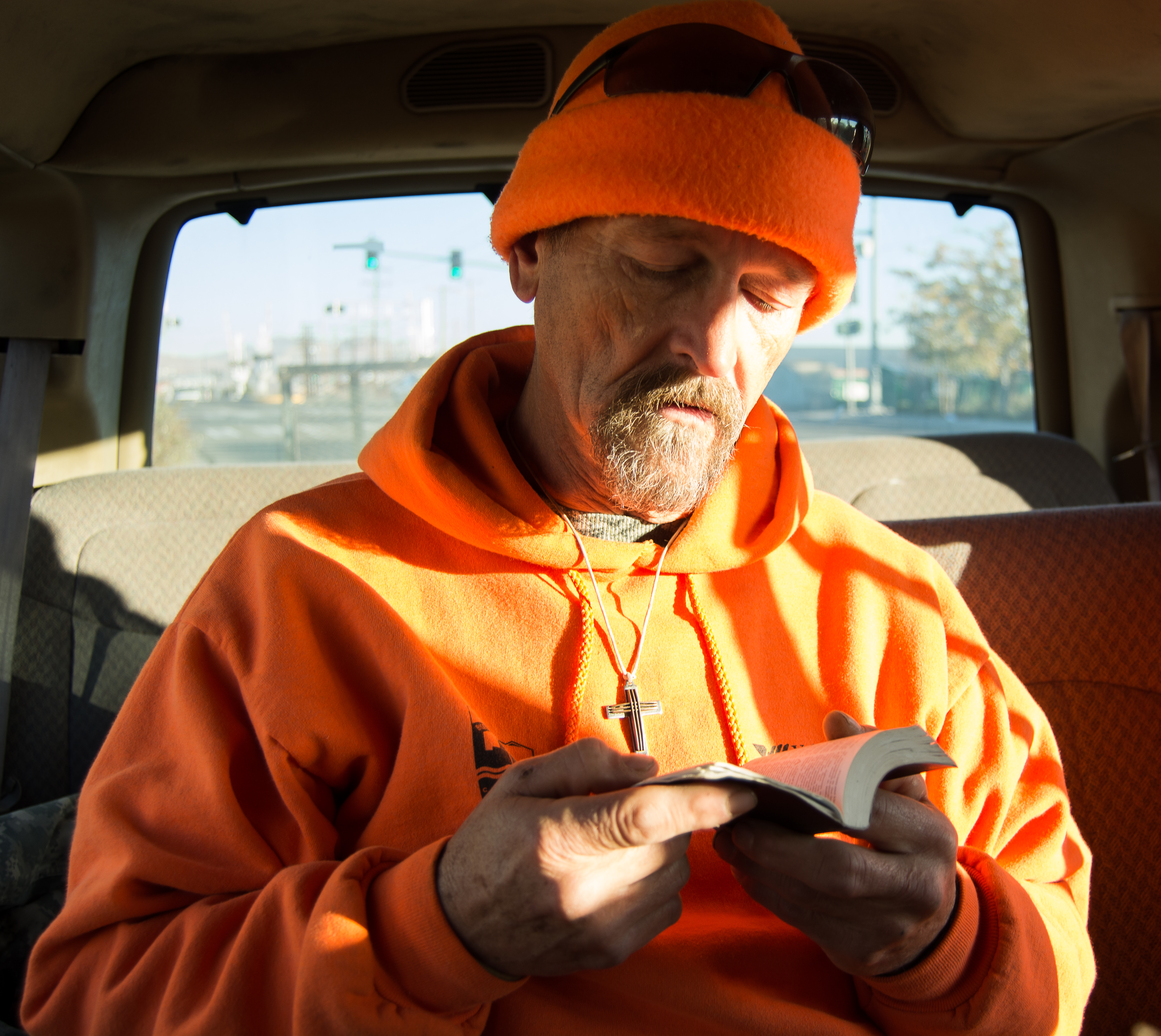Originally Published 12.04.2015 by Reno Tahoe Tonight©
“That’s a sharp,” said Darren Hinds, supervisor of the Reno Works crew, pointing to a syringe on the ground of a vacated homeless encampment on the banks of the Truckee River. “Who has the sharps container?” he calls aloud.
One of the crew members brings him a plastic orange container with a biohazard symbol printed on the side. He carefully picks up the needle with a mechanical trash picker and places it in the container. As the crew bags up the last of the belongings for pick-up and storage at the Volunteers of America (VOA) shelter on Record Street, the riverbank is as clean as the last time they visited this area over a week ago.
They are proud of their efforts, adding today’s total to over 400 yards of blighted riverbank they have cleaned up over the past eight weeks. They hope the residents of the camp will come to the shelter, though—if not to stay, at least to collect their belongings. They empathize because the Reno Works crew is homeless as well.

The Reno Works Initiative is a homeless work and education program conceived by Councilwoman Neoma Jardon and Pat Cashell, son of former mayor Bob Cashell and Regional Director of the Volunteers of America’s Northern Nevada branch, and funded by some of the City’s ten million dollar budget surplus.
“We decided on two, nine-week sessions, ten clients in each session; they’d work three days a week, Monday, Wednesday, Friday—six-hour days,” said Cashell. “And then on those Tuesdays and Thursdays they would be in class, taking classes such as resume building, Getting Ahead classes, OSHA certification.”
Cashell is uniquely qualified for his position as Regional Director. A former homeless person, he also struggled with meth addiction for ten years before becoming sober in 2006. His designs for the program are rooted in his own experiences with homelessness.
“What I thought helped me when I first got out of homelessness and drugs and all that stuff, I thought would benefit them as well,” he said. “Like the financial classes, that’s part of the reason they’re here, because they didn’t look after their finances. They all have incredible resumes, some of them have been cooks, chefs, welders—they have all kinds of assets and abilities that they obviously were at one time putting to good use.”
The first of these sessions convened in September after the initial application process. To join the program, applicants must be residents of the shelter and must comply with the VOA’s housing rules, including nightly curfew and bed checks. In the first session, Cashell had to ask three of the initial ten members to leave for violating these rules.
Those who complete the program are entitled to 2 years of supportive housing in the form of vouchers and subsidies from the city, as well as a biweekly paycheck as VOA employees for their community cleanup work. However, Cashell and the staff of the VOA consider the ten-dollar-an-hour paycheck a mere bonus compared to the long-term goals of the program.
At the crew’s second cleanup site of the day, Darren Hinds approaches a lean-to tent made from a blanket, hidden amongst the brush. He speaks with the sole occupant, a man named Carlos, asks him if he’s doing ok, and eventually encourages him to come by the shelter. Peer outreach is an important secondary job for the Reno Works crew, who never break down camps with people living in them—a practice Cashell calls “cannibalistic.”
Darren Armas, 50, the only one of the four crew members working that day to have spent time sleeping on the streets, is especially sympathetic. “There but by the grace of God go I,” he said.
Darren remembers watching his mother struggle to support he and his brother, and was introduced to drugs and alcohol early by his father’s biker club. After six years on the streets of Bakersfield, Calif., battling an addiction to meth and synthetic marijuana (called “spice”), he moved to Reno in May to pursue sobriety and be close to his eldest son.
“I hadn’t seen him for 9 years, and I remember the day that he said this to me, I went to tears like a little kid. He stood there and looked at me and said, ‘dad I’m proud of you.’ And I just lost it, because I hadn’t heard anything like that from someone in a very long time,” said Armas.

Now 9 months sober, Darren attributes his recovery to god—he can always be seen wearing the cross he bought from a friend with a five-dollar bill he found on the street. He and his girlfriend, whom he met at the shelter, intend to become volunteers at the VOA after graduating from the program.
As they continue to collect trash along the riverwalk, Melanie Young, 39, makes jokes at Jeff Stephens’, 29, expense—asking how much money he’s going to be paid at his new job, a chef at the Heritage restaurant in Whitney Peak hotel. Jeff and Melanie both grew up in single parent households, Jeff with four siblings and Melanie with one. Melanie came to Reno three years ago, and had lived in her mother’s house her whole life until her mother moved out in July, leaving Melanie and her three-year old daughter with no place to stay.
“Honestly, I’m not angry at my mom—we’re talking again, we didn’t speak for the three months. But I couldn’t even be mad at her because she finally gave me a gift: to stand on my own,” said Melanie. “The stigma with being homeless is ridiculous, everyone thinks you’re on drugs or you’re mental—hard times happen to good people.”
Melanie recently acquired her own apartment after staying with her daughter at the VOA family shelter for the past three months, and says the program provided motivation and a way of engaging problems she had never dealt with before.
“I hadn’t had a job in years and my confidence was down. I just had to get in motion and they helped so much,” she said.
Jeff, however, considers his time at the VOA to be an unfortunate fluke. After growing up in a stable home in Richmond, Calif., he and his longtime girlfriend decided to leave the city after learning she was pregnant, and losing three of his friends to street violence. When their plans to stay with a relative in Reno fell through, they came to the shelter.
“I ain’t really out here to make no friends,” said Jeff. “I said that in the beginning of the program, some of them was like “oh I’m your friend.” Like, I’m not saying I’m not going to talk to you guys and everything, or interact with you guys, but in the long run I’m really about just me and my family.”
Jeff has a self-proclaimed talent in many areas, including: music, design, cutting hair, and cooking, which he studied for three years at college in Las Vegas. His new job at Heritage and the housing provided by the city means that he can save money for his eventual goal of owning a food truck in Atlanta.
“There’s more to me than what you think, I’m well educated, my momma didn’t play no games when it came to schooling and working,” he said.
At the end of the workday, Angel Garcia, 61, begins to talk about the group’s upcoming graduation ceremony at City Hall. Angel is one of the more reserved members of the group, but is obviously excited at the prospect of completing the program.
“This is the first time and the last time I’m going to be coming here because I’m going forward not backwards,” he said.
Angel is reluctant to talk about how he came to live at the shelter, but after recounting his childhood memories of life in the barrio, and mother and father who worked hard to move the family out, he begins to talk about his future goal—retiring to Cancun and spending the rest of his days surfing.
Angel has struggled to find work in the months that he’s stayed at the shelter, and occasionally wonders if his age has become a barrier for employment.
“Some times I get depressed when I’m sleeping at night. I’ll say, “how come these cats ain’t called me? Because of my age maybe? Because maybe they think I’m going to retire in the next five years?” My health is good, I feel good, I’m ready to do whatever it takes to move on,” he said.
The Reno Works graduation is a small but intimate ceremony on the ground floor of Reno City Hall. The six graduates sit in the front row with their families behind them, and various VOA staff and City employees in the surrounding wings. There is a slide show and speech from Pat Cashell; Jeff even gets up to the mic to say an emotional thank you to Darren Hinds for his work as supervisor.
Melanie is absent, unfortunately. Her missing classes in the final week of the program made her ineligible for graduation, said Darren Hinds, but she still keeps in contact with the VOA from her new apartment. Darren also says that Carlos, the man camping by the river, had checked into the shelter a few days ago.
As the congratulations and hugs and requests for photos are exchanged, it’s apparent that some of the members of the group haven’t had cause for celebration in some time.

“The turning point of everything was when the City of Reno said they were going to provide money for the Volunteers of America for the Reno Works Program,” Said Chloe Allen, who missed the river cleanup day the week prior for her new job—assistant Chef at Macaroni’s Bar and Grill.
Chloe started living on the streets in LA in 2008, and since coming to the VOA shelter in July has found employment, housing, and a licensed payee to help her with her excess spending issues. Chloe would like to eventually become a facilitator for the Getting Ahead courses offered by the VOA, which she credits for helping establish her new life. Her facilitator, Jamie Peek, was the one to introduce her to the hiring staff at Macaroni’s.
“I think the world can turn around, but it’s not going to be in my lifetime I think. Unless, somebody like me stands up and speaks out … with this Getting Ahead class, we can do more than just sit by and let the world revolve,” she said. “This program gives hope to those who don’t have it.”

Comments are closed